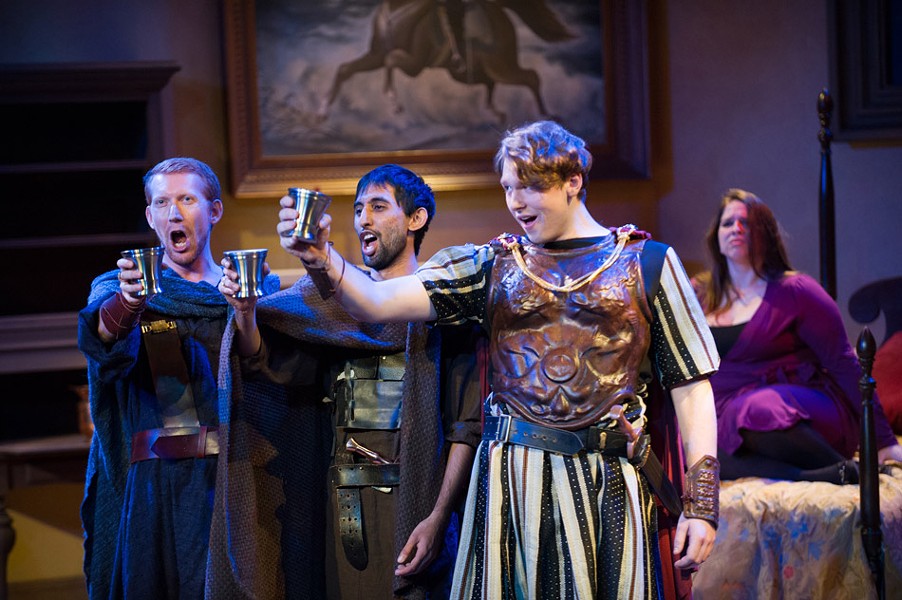"I love Britten!" says Steven Daigle, chair of the voice and opera department at the Eastman School of Music, and director of the upcoming Eastman Opera Theatre production of "The Rape of Lucretia" by British composer Benjamin Britten (1913-1976).
Daigle says, "It's not that I have a handle on the opera. What I like is that it makes you ask questions. Britten is always making you think about questions, drawing you in to making intellectual choices and determinations off of what you see and hear, and to question how the theme of the piece relates to you and your own life."
Daigle's production of the ancient tale will be set in the 21st century in the ritzy Hamptons area of Long Island. The opera was written by Britten in 1946 and Daigle describes it as having a "Victorian sensibility." Daigle has been developing the concept of setting the opera in the Hamptons for more than five years, doing workshops of various scenes, and waiting for the right mix of students to come along.
"The story of 'The Rape of Lucretia' is still fresh and vivid in our society," says Daigle. "This idea of power and control, the oppression of women, religious institutions, and how they are supposed to protect people — all of this is still relevant today."
Daigle liked the idea of setting the opera in the Hamptons to take advantage of what he sees as the parallels between the ancient tale and the trappings of wealth, established families, politics, and the military.
Daigle admires the way that Britten looked back to classical forms, such as the ancient tale of "The Rape of Lucretia," and how he drew on older tales to parallel his own life. When Britten was writing, England was at war, church was very much part of his life, and he was a pacifist.
"I try to be very conscious of the composer's original intentions," says Daigle. "I would hope that [Britten] would see the setting of this production as a way to access this piece by a modern audience."
The original tale of "The Rape of Lucretia" was set in the 5th century B.C. in Rome, in the midst of a political power struggle. A group of soldiers are drinking and boasting of their wives. To evaluate the wives, the men surprise the wives in their homes, finding all but one of them cavorting with other men. Lucretia is spinning with her female servants, pining for her husband, Junius, to return. Lucretia's virtue triggers the prince Tarquinius to test Lucretia, and, when she resists his advances, he forces himself upon her. Although Lucretia's husband offers consolations, Lucretia's sorrows overtake her, and she kills herself. Junius uses the crime by the price to ignite an uprising against the king.
Britten turned "The Rape of Lucretia" into a chamber opera of eight characters, accompanied by an ensemble of 13 musicians, in two acts, lasting approximately two hours. The production is sung in English.
With renovations going on at Eastman's Kilbourn Hall, Daigle and musical director Benton Hess were forced to look at alternative venues. They selected the Visual Studies Workshop. Daigle says that seating limited to 120 at VSW will increase the intimacy of the setting and the powerful intensity of the story, and, he adds, Britten's premiere was also mounted in a smaller, non-traditional space.
Preparation for the production also included preparing the Eastman students of the cast to handle the powerful subjects of Britten's opera. "The physicality of it is the most difficult part — we have a rape scene on stage," says Daigle. "We have to be able to give that level of physical activity to where it makes the audience uncomfortable, but doesn't go over that line. If you don't have it mapped out, it can be that the emotions take over and you can forget that it's artifice."
Daigle says that each student has his or her own way of working through the strong content; some like demonstration, some prefer discussion. "The students feel very much drawn to the story that we're telling," says Daigle. "We moved from a structural side into something that has organically grown. They're willing to take more risks because the groundwork is there."
Two additional productions will be mounted by Eastman Opera Theatre this season, Handel's "Orlando" (January 31-February 3) and Weill's "Street Scene" (April 4-7). Daigle's discussion of the upcoming production circles back to the message of the story and the opera as one of "pain."
"There are multiple tragedies," says Daigle. "We have to remember, 'The Rape of Lucretia' was created before the time of Christ, yet there's the parallel to the Christ story — dying for sins. Lucretia sacrifices herself to get away from an evil in the world. The opera defines a tragedy and also a reaction to it."
